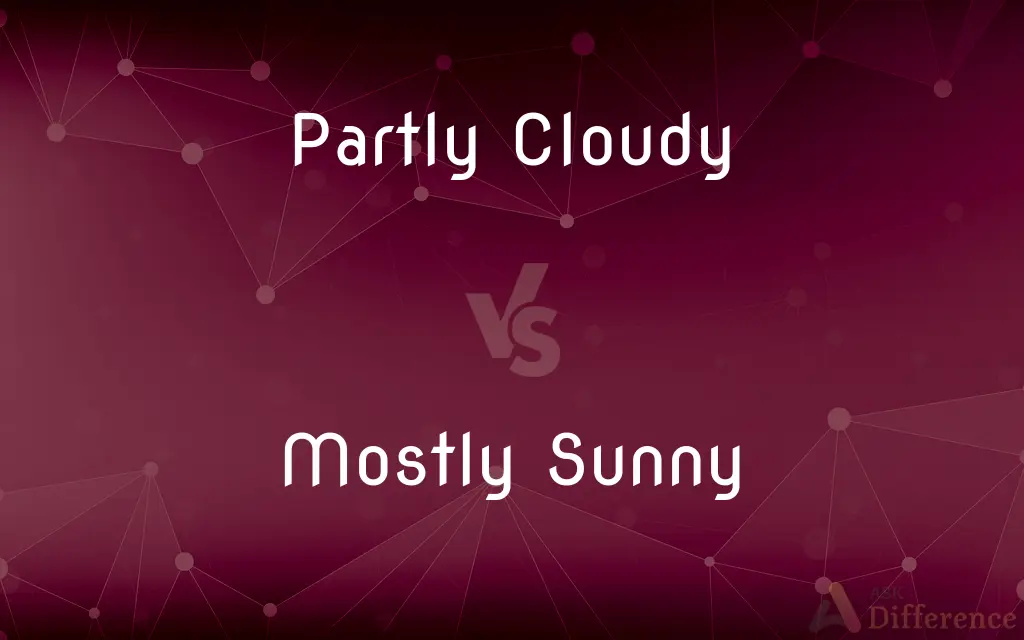Partly Cloudy vs. Mostly Sunny — What's the Difference?
Edited by Tayyaba Rehman — By Fiza Rafique — Published on November 5, 2023
"Partly Cloudy" suggests a significant presence of clouds, while "Mostly Sunny" indicates more sunlight with few clouds.

Difference Between Partly Cloudy and Mostly Sunny
Table of Contents
ADVERTISEMENT
Key Differences
"Partly Cloudy" refers to conditions where the skies are notably cloud-covered, though there is still some visibility of the blue sky. "Mostly Sunny," on the contrary, denotes a predominant sun presence, with occasional clouds disrupting the sunlight. Both terminologies describe weather but with different focal points on cloud and sun coverage.
In "Partly Cloudy," the emphasis rests on the existence of clouds, partially obscuring the sunlight. "Mostly Sunny" puts forth an image of a sky where sunlight dominates, even though clouds are not completely absent. Both expressions are, in essence, communicating the sky's appearance from contrasting perspectives.
"Partly Cloudy" implies that clouds significantly but not wholly cover the sky. In the context of "Mostly Sunny," the implication is that the sun is the most prominent feature in the sky. Each term inversely implies the presence and visibility of the sun and clouds respectively.
A day described as "Partly Cloudy" is understood to have considerable cloud cover but also periods of sunshine. Meanwhile, a day characterized as "Mostly Sunny" is predominantly bright and sunny, yet with sporadic clouds making a brief appearance. Both convey an interplay of sun and clouds with a different dominant entity.
"Partly Cloudy" often hints at a higher possibility of variable weather conditions, like brief rain. "Mostly Sunny," usually suggests stable, pleasant weather with minimal chances of precipitation. Here, both descriptions point towards weather stability but offer different predictions based on cloud or sun prominence.
ADVERTISEMENT
Comparison Chart
Grammatical Role
Adjective (Partly) + Noun (Cloudy)
Adjective (Mostly) + Adjective (Sunny)
Emphasis
On the presence of clouds
On the presence of the sun
Perception
May imply a possibility of changeable weather
Implies more stable and clear weather
Weather Prediction
Might hint at possible brief showers
Suggests minimal chance of precipitation
Emotional/Visual Impact
Might be perceived as less optimistic
Generally perceived as more optimistic
Compare with Definitions
Partly Cloudy
Suggesting clouds occupy a notable portion of the sky.
The partly cloudy sky cast intermittent shadows on the field.
Mostly Sunny
A meteorological term emphasizing sunlight over clouds.
Under the mostly sunny sky, the flowers bloomed vibrantly.
Partly Cloudy
Implies an equal or lesser degree of sun visibility.
Under the partly cloudy sky, the picnic continued with sporadic sun.
Mostly Sunny
Signifying a dominant presence of sunlight.
It was mostly sunny, perfect for a day at the beach.
Partly Cloudy
A meteorological term for partial cloud cover.
We decided to hike despite the partly cloudy forecast.
Mostly Sunny
Describing a sky where the sun is predominantly visible.
The mostly sunny day uplifted everyone’s spirits.
Partly Cloudy
Descriptive of skies with noticeable cloudiness.
The partly cloudy weather made for dramatic sunset photos.
Mostly Sunny
Indicating predominant sunshine with slight cloud intrusion.
Despite being mostly sunny, we spotted a few clouds afar.
Partly Cloudy
Indicative of moderate cloud cover.
The sky was partly cloudy, offering moments of sunshine.
Mostly Sunny
A weather condition with minimal cloud cover.
The mostly sunny forecast was ideal for the outdoor event.
Common Curiosities
Can "Partly Cloudy" indicate possible rain?
Yes, "Partly Cloudy" can sometimes hint at a chance of brief showers.
Is "Partly Cloudy" the opposite of "Mostly Sunny"?
Not exactly, but they represent contrasting weather focus: more clouds vs. more sun.
Is “Partly Cloudy” used to describe nighttime conditions?
Yes, "Partly Cloudy" can describe night skies with noticeable cloud cover.
Which indicates better weather for outdoor activities?
"Mostly Sunny" often suggests better outdoor weather due to predominant sunshine.
Can "Mostly Sunny" be used to describe winter days?
Yes, winter days with predominant sun can be described as "Mostly Sunny."
Can "Partly Cloudy" represent transitional weather?
Yes, "Partly Cloudy" can sometimes indicate changing or variable weather.
Does "Mostly Sunny" assure clear weather?
Largely, "Mostly Sunny" indicates clear, stable weather but doesn’t assure it.
Do "Partly Cloudy" and "Mostly Sunny" have similar meanings?
They both describe weather but emphasize different aspects (clouds vs. sun).
Can a day be both "Partly Cloudy" and "Mostly Sunny"?
Yes, the terms can be interchangeable depending on the observer's perspective.
Which term is generally perceived as more optimistic?
"Mostly Sunny" is often perceived as more optimistic due to the emphasis on sunlight.
Share Your Discovery

Previous Comparison
Indian Ocean vs. Arabian Sea
Next Comparison
The Muppets vs. Sesame StreetAuthor Spotlight
Written by
Fiza RafiqueFiza Rafique is a skilled content writer at AskDifference.com, where she meticulously refines and enhances written pieces. Drawing from her vast editorial expertise, Fiza ensures clarity, accuracy, and precision in every article. Passionate about language, she continually seeks to elevate the quality of content for readers worldwide.
Edited by
Tayyaba RehmanTayyaba Rehman is a distinguished writer, currently serving as a primary contributor to askdifference.com. As a researcher in semantics and etymology, Tayyaba's passion for the complexity of languages and their distinctions has found a perfect home on the platform. Tayyaba delves into the intricacies of language, distinguishing between commonly confused words and phrases, thereby providing clarity for readers worldwide.













































